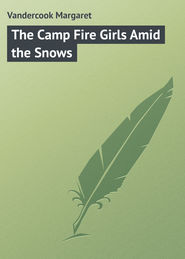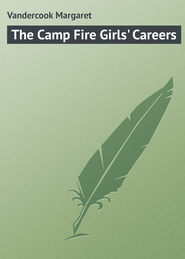По всем вопросам обращайтесь на: info@litportal.ru
(©) 2003-2024.
✖
The Camp Fire Girls by the Blue Lagoon
Настройки чтения
Размер шрифта
Высота строк
Поля
It was at Bettina's request that her father had undertaken to pay for the little girl's education. There had been no thought of making her a member of their household, save perhaps during certain holidays.
With Marguerite Arnot the circumstances were different. Marguerite was older and in spite of her difficult background of poverty and hard work[2 - See "Camp Fire Girls in Glorious France."] was possessed of unusual beauty and charm. Then at once Marguerite had responded to her mother's influence. Indeed, Bettina, although recognizing the unreasonableness of her own attitude, frequently had to stifle pangs of something approaching jealousy at the sympathetic relation between them.
Marguerite was no longer shy save in a graceful and attractive fashion. If she played but an inconspicuous part in the social life now surrounding her, she had the French tact and resourcefulness. It seemed to Bettina that, as her own difference of opinion with her mother had grown and developed, Marguerite was beginning to fill her place. In justice she could not criticize Marguerite for circumstances with which she had nothing to do, although not enjoying the idea that her mother was turning to some one else for the sympathy and devotion which should have been her own to give and to receive.
This afternoon, wandering about the Natural History Museum with Elce, Bettina was not particularly intent upon the exhibitions, but instead was planning a letter which she contemplated writing home later in the evening, when Mrs. Burton had gone to the theater and she could be alone.
She meant to surrender her own desire; nothing else appeared possible, but she also wished her family to appreciate that she believed she was being treated unjustly and that she had the right to her own choice of life.
Reaching a secluded corner and discovering an unoccupied bench, Bettina sat down, suggesting that Elce wander about alone and come back for her later. They were on the floor devoted to the reproduction of wild birds in their native haunts. Since the collection was a rarely beautiful one, Bettina believed it would be of so great fascination as to keep the younger girl occupied for some time. Personally she was already fatigued. Moreover, she wished for an opportunity to think without the possibility of being interrupted at any moment.
After her original talk with her Camp Fire guardian she had not referred to the subject of their interview. There was little reason why she should. Definitely she understood that Mrs. Burton's sympathy was with her mother and that she had but scant patience with her rebellion against what might appear to most girls as a singularly fortunate fate.
Bettina was not only disappointed, but puzzled and aggrieved. From any one save her Camp Fire guardian she would have expected such a point of view. She herself was able to accept the fact that it was but natural other people should consider an opportunity to enter Washington society, chaperoned by her mother and with her father's prominent official position, to be the summit of any natural girl's desire. Yet from her Camp Fire guardian Bettina had hoped for another viewpoint. Had she not heard her oftentimes insist that every living human being must follow his or her own road, and that whether for good or ill she could have followed no career save the one she had chosen.
The difference in their positions Bettina Graham had far too much intelligence not to recognize. She was not choosing the career of an artist and had revealed no exceptional gifts. She merely wanted to give her life in service to persons less fortunate than herself, rather than waste it, as she felt, in a society existence for which she had neither liking nor taste. There was nothing romantic nor inspiring in her desire. Her mother and father were both convinced that such work should be left to older women, or to girls who possessed neither her position nor opportunities.
So since the prop upon which unconsciously she had been leaning, Mrs. Burton's approval and help, had failed her, Bettina decided to make no further protest for the present. Later she must convince her family that her desire was not a whim, a moment's caprice, the influence of a stronger personality, which would vanish when other interests became more absorbing.
Suddenly Bettina got up, realizing that the room in which she was seated was growing surprisingly dark and that a guard was moving about, announcing that the hour for closing had arrived.
Before leaving Bettina had first to find her companion.
At the farther end of the room she observed that a small crowd had formed, who seemed loath to depart.
Drawing near, to her amazement she heard a number of beautiful, birdlike notes with which she was familiar.
Undisturbed by her audience, Elce was standing by a showcase filled with birds from the northern part of England, birds which the little girl had known almost from babyhood, as she had spent the greater part of her time in the woods. To-day amid strange and different surroundings, with apparent unconsciousness, she was repeating such bird notes as she could recall.
The crowd about her was amused and admiring.
Bettina laid her hand on the younger girl's shoulder.
"Elce, we must go at once, it is growing late. And you must remember you are not in the woods, or you will have so large an audience surrounding us some day that we shall not be able to make our escape. You are an odd child! I thought you were exceptionally shy and afraid of people, and now you do a surprising thing like this and appear not in the least abashed."
In farewell Elce was nodding to several persons who had been standing near. She appeared entirely unaware that her behavior had been unusual.
Out in the street Bettina discovered that the darkness had not been due solely to the lateness of the hour, but that a thunderstorm was approaching.
A few moments she stood hesitating. The History Museum was on the west side of the city and uptown and she wished to reach the east side and down town as promptly as possible. By what method she could most quickly accomplish this result she was not certain. Holding tight to her companion's hand Bettina made a hurried rush toward the Broadway subway.











